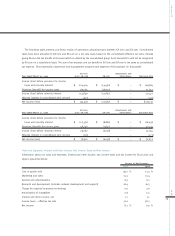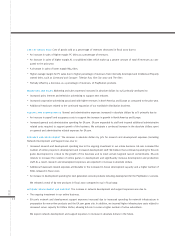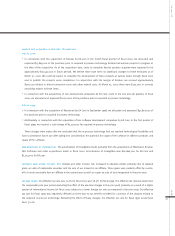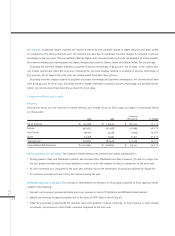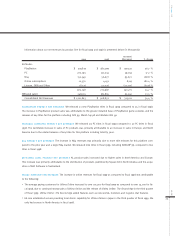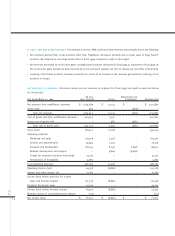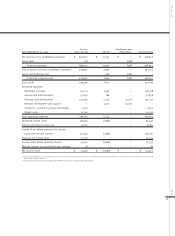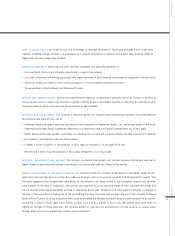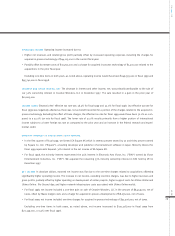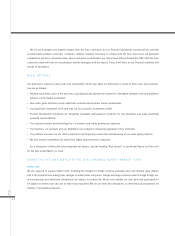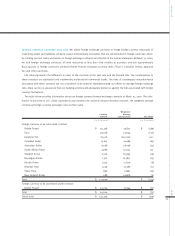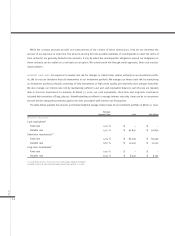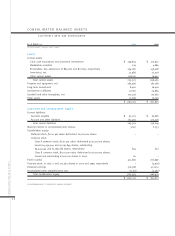Electronic Arts 2000 Annual Report Download - page 30
Download and view the complete annual report
Please find page 30 of the 2000 Electronic Arts annual report below. You can navigate through the pages in the report by either clicking on the pages listed below, or by using the keyword search tool below to find specific information within the annual report.
The nature of the efforts required to develop the acquired in-process technology into commercially viable products princi-
pally relate to the completion of all planning, designing and testing activities necessary to establish that the product can be
produced to meet our design requirements including functions, features and technical performance requirements. Though we
currently expect that the acquired in-process technology will be successfully developed, there can be no assurance that com-
mercial or technical viability of these products will be achieved. Furthermore, future developments in the entertainment software
industry, changes in computer or video game console technology, changes in other product offerings or other developments
may cause us to alter or abandon these plans.
The value assigned to purchased in-process technology was determined by estimating the completion percentage of
research and development efforts at the acquisition date, forecasting risk adjusted revenues considering the completion per-
centage, estimating the resulting net cash flows from the projects and discounting the net cash flows to their present values.
The completion percentages were estimated based on cost incurred to date, importance of the completed development tasks
and the elapsed portion of the total project time. The revenue projection used to value the in-process research and develop-
ment is based on unit sales forecasts for worldwide sales territories and adjusted to consider only the revenue related to
development achievements completed at the acquisition date. Net cash flow estimates include cost of goods sold and sales,
marketing and general and administrative expenses and taxes forecasted based on historical operating characteristics. In addi-
tion, net cash flow estimates were adjusted to allow for fair return on working capital and fixed assets, charges for franchise
and technology leverage and return on other intangibles. Appropriate risk adjusted discount rates ranging from 20% to 22.5%
were used to discount the net cash flows back to their present value. The remaining identified intangibles will be amortized on
a straight-line basis over two to twelve years based on expected useful lives of franchise tradenames, existing products and
technologies, retention of workforce, and other intangible assets. If these projects are not successfully developed, we may not
realize the value assigned to the in-process research and development projects. In addition, the value of other acquired intan-
gible assets may also become impaired.
In conjunction with the merger of Westwood, we accrued approximately $1,500,000 related to direct transaction costs and
other related accruals. At March 31, 2000, there were $500,000 in accruals remaining related to these items.
Additionally, for fiscal 1999, the charge for in-process research and development also included write-offs of $2,279,000 asso-
ciated with the acquisition of two software development companies in the first quarter.
For fiscal 1998, we incurred a charge of $1,500,000 for acquired in-process technology in connection with the acquisition of
the remaining 35% minority ownership interest in Electronic Arts Victor, Inc. in December 1997. This charge was made after we
concluded that the in-process technology had no alternative future use after taking into consideration the potential for usage
of the software in different products and resale of the software.
AMORTIZATION OF INTANGIBLES Amortization of intangibles results from the acquisitions of Westwood and ABC Software in
the second quarter of fiscal 1999.
MERGER COSTS On July 25, 1997, we completed a merger with Maxis, Inc. (“Maxis”). In conjunction with the merger, we record-
ed costs of $10,792,000 which included direct transaction fees and costs associated with integrating the operations of the two
companies. At March 31, 1999, there were no accruals remaining related to these merger costs.
MD&A
28



